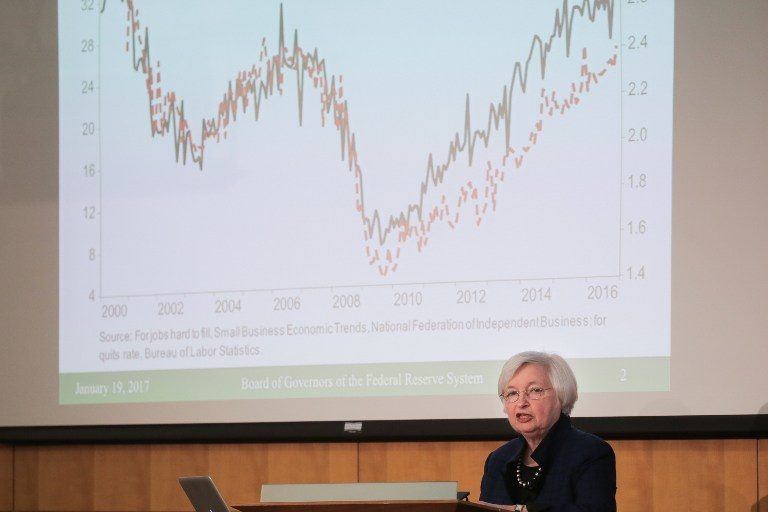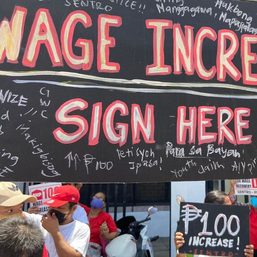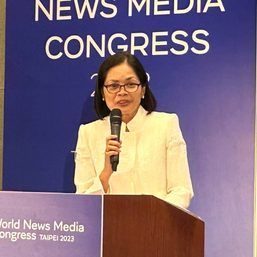SUMMARY
This is AI generated summarization, which may have errors. For context, always refer to the full article.

WASHINGTON, USA – President Donald Trump’s plans to upend US trade policy with import tariffs and new negotiations, slash taxes, and spend on infrastructure makes the Federal Reserve’s work more challenging this week.
Since his election in November, Trump’s pronouncements have left US central bankers guessing and citing the “considerable uncertainty” for monetary policy until they turn into specific policies.
Fed members have raised the possibility they may have to increase interest rates faster than they had planned before Trump’s surprise election victory, and have said they will be watching for the new administration’s policies.
But meanwhile, economists say that when the policy-setting Federal Open Market Committee gathers in Washington Tuesday and Wednesday, January 31 and February 1, to review monetary policy, it is likely to stand pat, as the outcome of any new Trump fiscal and trade moves remains far off.
“My guess is there won’t be any action,” said Edwin Truman, a former FOMC staff economist now at the Peterson Institute for International Economics in Washington.
“The outlook looks a bit stronger, both in the United States and the world,” he told AFP. “But as for the shape of fiscal policy … we don’t really know a lot more than we did in December.”
The Fed in December raised rates for only the second time in a decade, increasing the target range by a quarter point to 0.5-0.75% to help head off inflation as the somewhat sluggish recovery from the Great Recession continues.
The odds of another increase remain below 40% until the 3rd meeting of the year in May, according to Fed fund futures markets.
US central bankers have made clear that despite the fairly tepid recovery, the economy appears to be on track to achieve its primary goals of full employment and 2% inflation.
The unemployment rate has remained under 5% and job creation has been steady at an average of 165,000 new positions a month. Despite years of low inflation, the Fed’s favored price measure, the personal consumption expenditures index, has been trending up slowly.
However, economic growth slowed sharply in the final quarter of last year, pulling 2016 growth down to 1.6%, the lowest since 2011.
New FOMC voters
Adding another wrinkle to the attempts to gauge how the Fed will react, the composition of the Federal Open Market Committee will change as it always does at the first meeting of the year, and this time will include 3 first-time voters.
The change might mean the committee could become less hawkish than it was in 2016, when Esther George of the Kansas City Fed dissented at 6 of last year’s 8 Fed meetings to vote in favor of rate hikes. The Boston Fed’s Eric Rosengren dissented in September, while Cleveland’s Loretta Mester dissented in September and November.
Those 3 will be replaced by some of the newest Fed officials: Patrick Harker, head of the Philadelphia Fed bank, Neel Kashkari of Minneapolis, and Robert Kaplan of Dallas.
Fed Chair Janet Yellen has said the economy is on course to meet the Fed’s targets for inflation and full employment, but the central bank will be watching to see what policies the administration pursues. She has said spending to increase productivity would be welcome, since that would increase growth without driving inflation.
Trump’s new policies could affect the Fed’s path but “at this point, however, the size, timing, and composition of such changes remain uncertain,” she said in a recent speech.
Trump’s big ‘meh’
Jared Bernstein of the Center on Budget and Policy Priorities said that while Wall Street had rallied since the election, Americans were beginning to understand that any direct influence from Trump on the economy was most likely to occur further down the road.
“Market participants continue to take Donald Trump way too seriously in terms of fiscal policy,” he said.
“Yes, there’s going to be a tax cut. The earliest it’s going to kick in is 2018,” Bernstein told AFP. “An infrastructure plan is a big question mark. House Republicans see it as a big ‘meh.'”
“The Fed has understood this, maybe because they’re here in DC and they’re not quite as excitable.”
Tim Duy, an economist at the University of Oregon and close observer of the Fed, said the uncertainty that Trump had created was still weighing on policymakers and could fuel inflation.
“I get the sense they think the administration’s policies are leading to an environment that is weighted to the upside with inflation risks,” Duy said. – Rappler.com
Add a comment
How does this make you feel?










There are no comments yet. Add your comment to start the conversation.